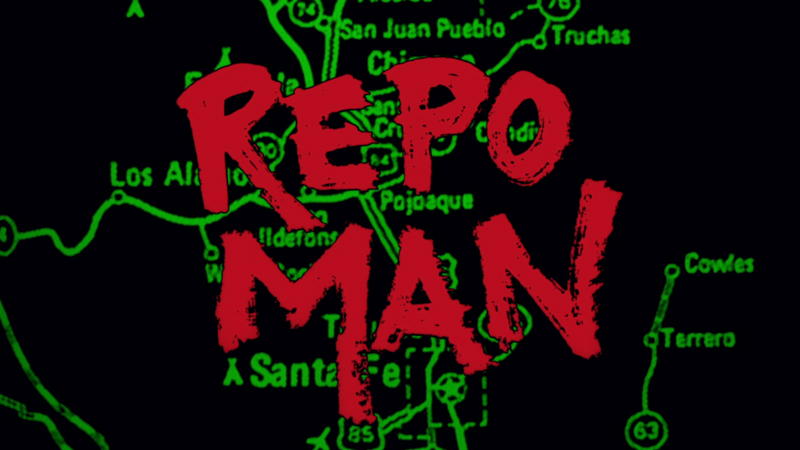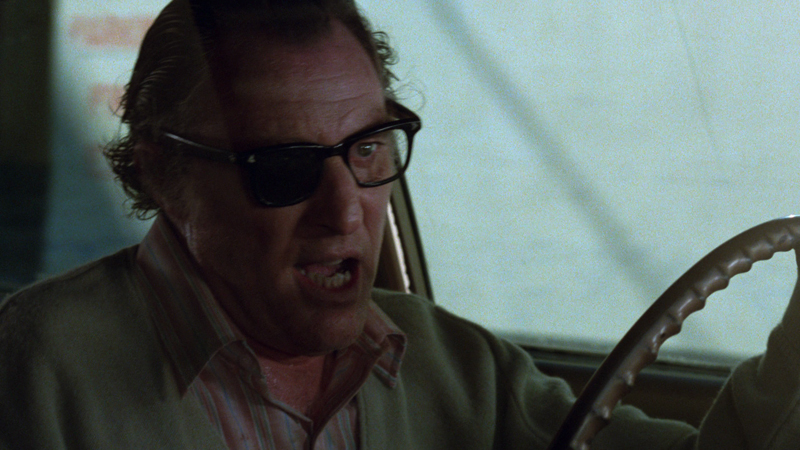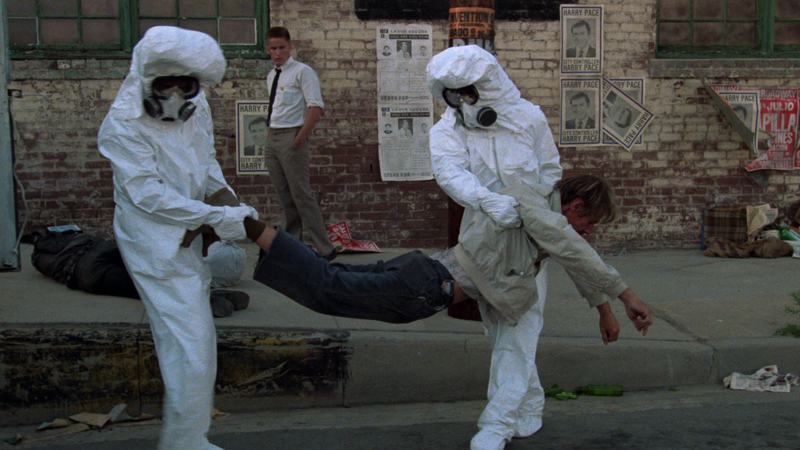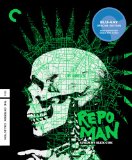| Reviews & Columns |
|
Reviews DVD TV on DVD Blu-ray 4K UHD International DVDs In Theaters Reviews by Studio Video Games Features Collector Series DVDs Easter Egg Database Interviews DVD Talk Radio Feature Articles Columns Anime Talk DVD Savant Horror DVDs The M.O.D. Squad Art House HD Talk Silent DVD
|
DVD Talk Forum |
|
|
| Resources |
|
DVD Price Search Customer Service #'s RCE Info Links |
|
Columns
|
|
|
Repo Man
Brilliant '80s time capsule in cult-classic form

Loves: Crazy plots
Likes: Don Coscarelli films
Dislikes: Gore
Hates: When people can't handle originality
The Movie
Unlike many fans of Repo Man, I discovered the film a bit later in life. I was always aware of the film, even if I did sometimes confuse it with another Emilio Estevez favorite, Men at Work, but it took some time before I gave it a good look. I feel like most of the film's fans first saw it at an age where they could identify with Estevez' Otto, an angry young man without much direction, clinging to whatever gave him some sense of place or purpose, be it punk rock or the car repossession work he falls into.
As an older convert, it's the film's subversive themes, philosophical elements and remarkably memorable dialogue that really hits home the most. As Otto gains entry into the world of the repo men, including angry old Bud (Harry Dean Stanton), street-wise Lite (Sy Richardson) and space-case Miller (Tracey Walter), he starts to take a bit from each of their personalities, especially Bud, who takes him under his wing in order to teach him "the Repo Code," a personal set of rules to live by that could work for repo men or anyone else. They'll come in handy as they seek to recover an old Chevy Malibu with an unusually high bounty on it.
The thing is, that's just part of the story. As Miller tells Otto, life has a "lattice of coincidences," and so does this movie, as people start coming together through a variety of reasons, including a trio of nihilistic punks on a crime spree (including Dick Rude and Miguel Sandoval), a pair of car-stealing brothers and a strange man (the late, great Fox Harris) hauling deadly cargo not unlike the Ark of the Covenant, who's trailed by the government. Of course, Otto finds himself drawn into the fray for no great reason, when he finds himself attracted to a girl on the run (Olivia Barash.) Though, as played by Estevez, Otto is something of a blank avatar, buffeted by the winds into any new direction, free of any noticeable motivation outside of a desire to get what's his, it's easy to go along for the ride.He's the perfect representative of the time, defined by outside forces and taking what he wants.

As enjoyable as the subtext and the strange sci-fi tale that camoflages it are, the film's dialogue, delivered with gusto by an excellent cast, is probably the reason its retains its cult popularity today, as the bite-size bits of genius throughout serve as handy promotional material. You don't go more than a few minutes without hitting a line so original and so intrinsically tied to this film that just saying it makes it clear you're a member of a very select group of cinephiles. Whether it's a punk kid enthusiastically saying "Let's go do some crimes!" or one of Miller's whacked-out philosophical statements, like "The more you drive, the less intelligent you are," everything speaks in the voice of Repo Man. That's largely due to the film's authenticity, as first-time feature writer-director Alex Cox imbued it with a punk-rock ethos (casting legit members of the punk scene) and drew on his own experiences in the world of repossession.
Though you don't hear a lot of people talking about Repo Man much these days (even Estevez, the star of the show, is entirely absent from this set) and Cox' career hasn't matched its early heights (nailing it with Repo Man, Sid and Nancy and Walker as three of his first four directorial efforts), the film's influence as a seminal '80s cult classic is still felt today. Take a look at Napoleon Dynamite. There's no way that that character wasn't at least somewhat inspired by dorky Kevin (Zander Schloss), with his frizzy hair, giant glasses and awkward personality. And on Fringe, Nina Sharp, the secretive head of a quasi-governmental group involved in interplanetary plots with a robotic hand is as close as you could get to Susan Barnes' Agent Rogersz without being slapped with a plagiarism complaint. You could even argue there's a bit of Repo Man in the philosophical musings of The Big Lebowski (those three crap nihilists sure feel similar to Cox' meaing-free punk crime trio) or the intertwined California stories of Paul Thomas Anderson's Magnolia. Between this and The Adevntures of Bucakroo Banzai Across the Eight Dimension!, the standard was set for absurd (and absurdly funny) satire that's not afraid to delve into more mature concepts.

The Disc
Repo Man arrives on one Blu-Ray disc in a gorgeously-designed, 'zine-inspired digipack with a 68-page booklet, inside a slipcase with the best Criterion cover art in recent memory. The disc sports the simple, yet beautiful standard Criterion menu design (again sporting 'zine style art) which offers the choice to watch the film, navigate the timeline, select scenes, adjust the set-up and check out the special features. There are no audio options, but subtitles are available in English SDH.
The Quality
From the moment the razor-sharp blood-red block letters of the opening titles appear, followed by the clearly defined trails in the dirt of California's desert roads, you know this is a quality presentation. The 1080p, AVC-encoded transfer on Repo Man was given a thorough clean-up by Criterion, a fact that's made all the more obvious by the inclusion of an unrestored version of the film as an extra. Cinematographer Robby Muller got the most out of the film's budget and Los Angeles locations, helping create some fantastic images that this release showcases beautifully. This transfer, approved by Cox, opens up the film to a 1.78:1 aspect ratio (showing more top and bottom versus previous releases) and offers up a crisp image that's got fine detail to spare. Colors are appropriate across the board (even during the film's iconic day-glo finale) and the black levels are nice and deep, keeping the film from getting lost in murkiness during darker scenes. Digital distractions are not noticeable and dirt and damage are virtually absent, though some minor noise creeps in in spaces of flat color (usually the light blue sky.)
With such a strong soundtrack, the temptation must have been there to create a new blow-out 5.1 track (like the one Criterion delivered for Christopher Nolan's Following) but the PCM mono track here not only does the trick while being faithful to the original presentation, it also fits the punk-rock feel of the film. One of the things that's most technically striking about Repo Man when you watch it is how deeply layered the audio is, to the point where you'll be hearing things you aren't seeing, while the sound that's associated with the visuals is still clearly evident. Meanwhile the very '80s score gets all the oomph it needs to set the tone. Usually one of the signs of a good track is that the elements enjoy good separation, but here, the impressive mixing marks this as an excellent presentation.
The Extras
To supplement their version of Repo Man, Criterion's brought back some extras from previous releases of the film, and added some new featurettes of their own, starting with "Plate o' Shrimp" (19:19). Featuring new interviews with musician Keith Morris, Rude, Barash and Sandoval, the piece focuses on stories from the production and the film's connection with punk rock music, even if, at this point, they don't quite fit the profile. The theme continues with "Iggy Pop", an 11:57 interview with the rock legend. Somehow, before getting him to talk about the film's themes, his work on the theme song and anything else that crosses his mind, they managed to get him to put on a shirt, even if he didn't button it.
The carryover extras start with a feature-length audio commentary from Cox, producer Mike Nesmith (yes, that Mike Nesmith), casting director Victoria Thomas and actors Richardson, Schloss and Del Zamora. (This track was recorded in 2000 and has been available on previous DVD releases.) The group does a nice job of not talking over each other, pointing out details and errors you might have missed and talking about the casting, he soundtrack and even business aspects of the film. A friendly sextet, the tone is light and fun, making for an enjoyable track.
Originally recorded for Universal's DVD release in 2005, "Repossessed" (25:31) sees Cox sitting down with his producers Peter McCarthy and Jonathan Wacks to share stories about the production, the cast and the political themes in the film, with additional thoughts from Zamora, Richardson and Rude.
"Harry Zen Stanton" (21:21) is a rather unusual actor interview, as McCarthy sat down with Stanton in 2005 and got into some rather deep conversation, taking about the meaning of the universe and predestination, as well as how Stanton's philosophy ties in with his acting. It's probably one of the more honest and interesting actor profiles committed to home video.
Instead of just putting together a pile of deleted scenes, this 2005 featurette (25:11) wraps them around interviews by Cox with Nesmith, neutron bomb-inventor Sam Cohen and one of the characters from the film, J. Frank Parnell. The excised bits are somewhat random, including a more graphic sex scene and more details on Parnell earlier in the film, and were best left out. The interviews are much more interesting, and they even give you a peek at Cox' original ending for the film. My favorite part though has to be the fact that the guy who invented the neutron bomb can't work a VCR.
During the audio commentary, Cox mentions editing the film for TV, and how it checked in at under an hour, so deleted scenes had to be reinserted. If you'd like to see the results, the TV version (1:36:54) is included here, presented in pillar-boxed 1080i (and obviously not restored like the main feature.) The real joy is the dubbed-over profanity, which is just ridiculous, especially for any of Stanton's cussing, though trying to decipher the reasoning behind the positioning of some of the replacement scenes might deliver some enjoyment as well.
Two trailers for the film, which utilize some of the deleted material, are also available.
This release includes more than Criterion's usual printed essay, as an excellent 68-page booklet, designed to look like an old-school, lo-fi 'zine, includes an in-depth essay on the film by author and Californian Sam McPheeters, an illustrated history of the production by Cox, titled "The Repo Code," and a 1987 interview by Cox and Rude with repo man Mark Lewis, whom the movie is based on, along with the usual details about the movie and Blu-Ray release. Though the essay and interview are definitely worth reading, "The Repo Code" is the big draw, as it includes not only Cox's original comic book concept but the investor plan for the film, an education in '80s indie film finance.

The Bottom Line
Despite feeling somewhat like a very '80s mash-up between a Mystery Science Theater 3000 sci-fi film, an absurdist comedy and an existential indie film, Repo Man manages to deliver the best of all three worlds in a tidy, funny cult-friendly package with a great punk soundtrack. Criterion holds up their end of the bargain as well, delivering an equally impressive package that mixes old and new material in high quality, bringing enough to the table to make it well worth the upgrade from the previous DVD. It's not going to be everyone's cup of tea, but for fans of the unique and quirky, it doesn't get much better.
Francis Rizzo III is a native Long Islander, where he works in academia. In his spare time, he enjoys watching hockey, writing and spending time with his wife, daughter and puppy.Follow him on Twitter
*The Reviewer's Bias section is an attempt to help readers use the review to its best effect. By knowing where the reviewer's biases lie on the film's subject matter, one can read the review with the right mindset.
|
| Popular Reviews |
| Sponsored Links |
|
|
| Sponsored Links |
|
|
| Release List | Reviews | Shop | Newsletter | Forum | DVD Giveaways | Blu-Ray | Advertise |
|
Copyright 2024 DVDTalk.com All Rights Reserved. Legal Info, Privacy Policy, Terms of Use,
Manage Preferences,
Your Privacy Choices | |||||||













